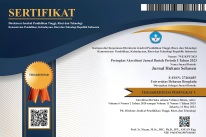Reviewing The Efficiency Of Restorative Justice Implementation In The Dispute Between PT Indonesia Huabou Industrial Park And The Murowali
Abstract
Land plays a very important role in human life, especially in Indonesia, where it is considered a natural resource controlled by the state for the welfare of the people. However, agrarian conflicts often arise, such as the one between PT Indonesia Huabao Industrial Park (PT IHIP) and the Morowali community. This study aims to analyze the mediation mechanism based on the principle of restorative justice in resolving agrarian disputes. Data shows that in 2023, Indonesia experienced 241 agrarian conflicts that harmed many parties, including 608 land rights defenders. This conflict not only has social impacts, but also economic and environmental impacts, such as gas emissions and deforestation due to nickel factory operations. The research method used is descriptive qualitative with a normative legal approach, examining various regulations and legal doctrines. The results of the study show that mediation can be an initial solution in the settlement, but is often ineffective due to the absence of the parties involved and the great influence of one of the parties. Therefore, the application of the principle of restorative justice in mediation is expected to improve relations between the disputing parties and reduce the potential for future conflict. This approach emphasizes inclusive dialogue and reparation for the aggrieved parties, in line with the goal of progressive law to create social welfare.
Downloads
Copyright (c) 2025 Muhammad Rifki Prayoga, Ozha Tiwa Hiawananta, Syaifullah David Septiawan

This work is licensed under a Creative Commons Attribution-ShareAlike 4.0 International License.






